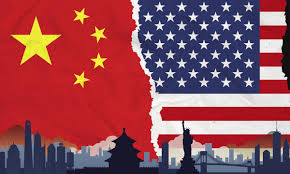Trump is right to turbocharge American AI and confront Chinese government | Opinion
Today's military conflicts look vastly different than when I joined the Tennessee National Guard in 1990.
Back then, we trained for traditional combat missions. Now, our biggest fights happen in cyberspace where hostile nations wage round-the-clock attacks against American targets.
Adversaries of the United States have invested billions in sophisticated hacking operations targeting our military and civilian infrastructure — from power plants to water systems to hospitals. These attacks aim not just to steal sensitive information, but to compromise critical systems and gain advantages that could give them the upper hand in future conflicts.
As a retired Army Brigadier General who served for 30 years, including a deployment during Operation Iraqi Freedom, I have seen how American technological supremacy helped protect our national security.
But the challenges we face in 2025 and beyond are more complex and dangerous than ever before. Thankfully, President Trump is addressing the challenge head on by bringing tech leaders together with the new Stargate Program, which will turbocharge AI development in America and ensure we protect emerging technologies and maintain our dominance.
President Trump’s decisive action on AI is not a moment too soon. Chinese tech companies have rapidly developed and unveiled competing AI models like DeepSeek, despite technology export bans preventing the export of advanced chipmaking tools to China.
Illustration of hacked elections
This raises troubling questions: How did these developments emerge so quickly, and are American companies operating in China inadvertently aiding Chinese AI development?
U.S. tech companies have rushed to gain a foothold in China. It makes sense – China's massive population and appetite for American tech makes it an irresistible market. But working in China comes with its own rules thanks to the iron grip of the Chinese Communist Party.
One of the American companies with the largest footprints in China is Microsoft. They maintain over 9,000 employees in China, with 80% working as software engineers who develop source code for products used throughout our government.
This arrangement might make business sense, but the risks to our national security are significant. Chinese law requires Microsoft to provide Communist government authorities access to this source code, encryption keys, and even backdoor access to their products.
Even more concerning, Microsoft must report software vulnerabilities to Chinese regulators before notifying American customers or authorities, giving potential adversaries advance notice of weaknesses they could exploit.
The consequences of these arrangements became painfully clear in the summer of 2023 when Chinese state-backed hackers breached Microsoft's systems and accessed over 60,000 emails from high-ranking officials, including our Commerce Secretary and Ambassador to China.
Months later, Russian hackers penetrated Microsoft's defenses again, stealing correspondence between U.S. federal agencies and the company itself. Plain and simple: the Chinese Communist Party is using American technology to threaten our national security.
Opinion: Taiwan shows how Tennessee with TVA support will be at forefront of innovation.
The scale of this threat becomes even clearer when you understand just how dependent our government has become on Microsoft's products. Approximately 85% of federal employees use Microsoft software for their daily work.
A core military principle is to never rely on a tool with a single point of failure − always maintain backup systems and alternate capabilities.
Yet we have abandoned this wisdom in our digital infrastructure, allowing our agencies to become dangerously reliant on a single provider that maintains deep ties with an adversary. Microsoft has also worked to stifle competition by locking these agencies into restrictive contracts and charging them significantly more to use their software with other providers.
The federal and military apparatus of our country is massive, yet we accept occasional security breaches of poorly secured software by China as inevitable. That’s why I am encouraged by the Trump Administration and the Federal Trade Commission continuing to look at these concerning business practices.
Along with this investigation, Congress must examine American tech development in China and establish new requirements ensuring companies that handle sensitive government data are not compromised by foreign adversaries. We must also promote competition in government procurement to reduce our vulnerability to any single provider.
Kurt Winstead
The oath I took to protect and defend the Constitution did not end when I retired from military service. Congress and the executive branch must act now to close this dangerous gap in our cyber defenses before more damage is done to our national security.
Our enemies are already inside the wire – it is time to strengthen our digital fortifications and ensure American technology serves American interests first.
Kurt Winstead is a retired U.S. Army Brigadier General and a practicing attorney in Nashville. He has served on the board of directors for numerous Middle Tennessee nonprofits and as an adjunct instructor for undergraduate Business Law at Belmont University.
This article originally appeared on Nashville Tennessean: Chinese state interference in U.S. businesses is a danger | Opinion














